

Hugh Herr: The new bionics that let us run, climb and dance. Beyond bionics: how the future of prosthetics is redefining humanity. Future - The 'super suit' that helps people move. From tracking your daily target of 10,000 steps to using a smart watch to check our bank account, many of us already take advantage of wearable technology.
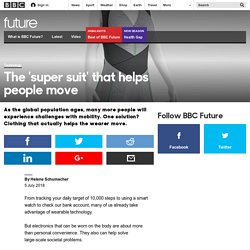
But electronics that can be worn on the body are about more than personal convenience. They also can help solve large-scale societal problems. Take the ageing population, “poised to become one of the most significant social transformations of the twenty-first century”, according to the United Nations. Peptide-based biogenic dental product may cure cavities. Health and medicine | News releases | Science | Technology April 12, 2018.
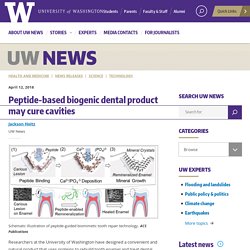
Digitaltrends. This implant could transform the way we fix broken bones. In Brief Severely broken bones are typically mended with the help of metal plates, screws, and more.
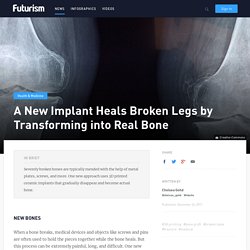
One new approach uses 3D printed ceramic implants that gradually disappear and become actual bone. New Bones When a bone breaks, medical devices and objects like screws and pins are often used to hold the pieces together while the bone heals. Scientists have found a drug that can repair cavities and regrow teeth. In Brief A new discovery about a drug developed for Alzheimer's patients might replace fillings for cavity repair.
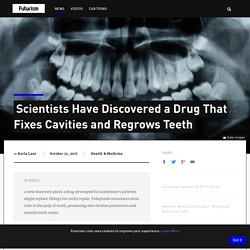
Tideglusib stimulates stem cells in the pulp of teeth, promoting new dentine production and natural tooth repair. Dental fillings may soon be left in the ash heap of history, thanks to a recent discovery about a drug called Tideglusib. Developed for and trialled to treat Alzheimer’s disease, the drug also happens to promote the natural tooth regrowth mechanism, allowing the tooth to repair cavities. Tideglusib works by stimulating stem cells in the pulp of teeth, the source of new dentine. A Lego-Friendly Prosthetic Arm Lets Kids Build Their Own Attachments.
Soon, decayed tooth may repair itself. Chatbot Wears Down Proponents of Anti-Science Nonsense. Nigel Leck, a software developer by day, was tired of arguing with anti-science crackpots on Twitter.
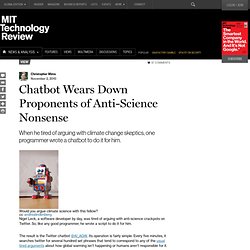
So, like any good programmer, he wrote a script to do it for him. The result is the Twitter chatbot @AI_AGW. Its operation is fairly simple: Every five minutes, it searches twitter for several hundred set phrases that tend to correspond to any of the usual tired arguments about how global warming isn’t happening or humans aren’t responsible for it. Ray Kurzweil Explains the Coming Singularity. Www.psy.unipd.it/~tressold/cmssimple/uploads/includes/ESPNQ010.pdf. The Metamorphosis of Prime Intellect. Updated February 2013...
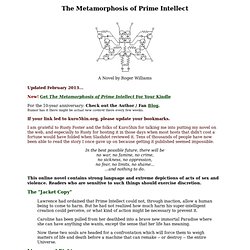
A Drug That Could Give You Perfect Visual Memory. Scientist finds potential cure for AIDS. David Harrich, from the Queensland Institute of Medical Research, said he had successfully modified a protein in HIV that the virus needed to replicate and instead made it "potently" inhibit virus growth.
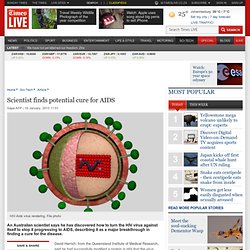
"I have never seen anything like it. The modified protein works every time," said Harrich. "If this research continues down its strong path, and bear in mind there are many hurdles to clear, we're looking at a cure for AIDS. " Harrich said the modified protein, which he had named Nullbasic, had shown a "remarkable" ability to arrest HIV growth in a lab environment and could have exciting implications both in curbing AIDS and treating existing HIV sufferers.
He described it as "fighting fire with fire". "The virus might infect a cell but it wouldn't spread," said Harrich of his study, published in the latest edition of the journal Human Gene Therapy. Immortality only 20 years away says scientist. 'First human head transplant now possible', neurosurgeon claims. DNA trick throws ageing into reverse - health - 29 November 2010. A technique to keep the tips of your chromosomes healthy could reverse tissue ageing.
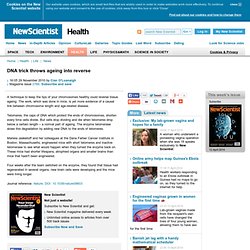
The work, which was done in mice, is yet more evidence of a causal link between chromosome length and age-related disease. Telomeres, the caps of DNA which protect the ends of chromosomes, shorten every time cells divide. But cells stop dividing and die when telomeres drop below a certain length – a normal part of ageing. The enzyme telomerase slows this degradation by adding new DNA to the ends of telomeres. Mariela Jaskelioff and her colleagues at the Dana Farber Cancer Institute in Boston, Massachusetts, engineered mice with short telomeres and inactive telomerase to see what would happen when they turned the enzyme back on.
Four weeks after the team switched on the enzyme, they found that tissue had regenerated in several organs, new brain cells were developing and the mice were living longer. Journal reference: Nature, DOI: 10.1038/nature09603. Eye implants restore 'useful sight' to two blind patients. The first blind patients to be fitted with electronic eye implants in a UK clinical trial have regained "useful vision" only weeks after surgery.
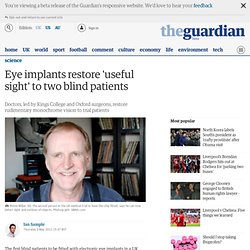
Chris James was able to see outlines of objects for the first time in 20 years after surgeons fitted him with the device during an eight-hour operation. The 51-year-old from Wiltshire, who lost his sight to the disease retinitis pigmentosa (RP), is one of two patients taking part in the first UK trial of the technology that began in April. Doctors said that both patients showed improvements in their eyesight that "exceeded expectations". James, who works for Swindon borough council, was diagnosed with RP in his mid-20s. His sight gradually deteriorated until he was blind in the left eye and could tell only light from dark in the right. Russian research project offers 'immortality' to billionaires - by transplanting their brains into robot bodies. Contacted list of world's richest to offer immortalityWill personally oversee brain transplant into robot bodyEntrepreneur claims to have 30 scientists working on projectAims to 'transplant' human mind into robot body in 10 yearsClaims 'next stage' of science is to create a 'new human body''This project is leading to immortality,' says Dmitry Itskov By Rob Waugh Updated: 12:42 GMT, 18 July 2012.
'Naked Darth Vader' approach could tame antibiotic resistant superbugs. Rather than trying to kill bacteria outright with drugs, Université de Montréal researchers have discovered a way to disarm bacteria that may allow the body's own defense mechanisms to destroy them.
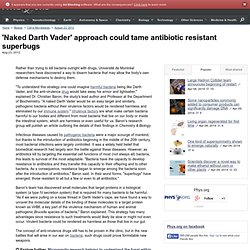
"To understand this strategy one could imagine harmful bacteria being like Darth Vader, and the anti-virulence drug would take away his armor and lightsaber," explained Dr. Christian Baron, the study's lead author and Professor at the Department of Biochemistry. Extend your life span without dieting! Want double fries with that Big Mac? No prob — just ask for a side order of FGF21! (Credit: McDonald’s) Woo hoo! UT Southwestern Medical Center researchers have found that a starvation hormone markedly extends life span in mice without the need for calorie restriction. Yes! Restricting food intake has been shown to extend lifespan in several different kinds of animals. Male mice that overproduced the hormone had about a 30 percent increase in average life span and female mice had about a 40 percent increase in average life span,” said senior author Dr.
Robot learns self-awareness. Who’s that good-looking guy? Nico examines itself and its surroundings in the mirror. (Credit: Justin Hart / Yale University ) “Only humans can be self-aware.” One Step Closer to a Brain. Scientists to simulate human brain inside a supercomputer. Researchers say building a computer simulation could improve understanding and treatments of brain diseases like Alzheimer's. Human Brain Project will use supercomputers to mimic tangle of neurons and synapses that power our thoughtsScientists say the simulator could offer new insight into the treatment of brain disease like Parkinson's and Alzheimer's"Brain in a box" is unlikely to transform into sci-fi-style computer bent on world domination, scientists say.
Computer smart as a 4-year-old. Artificial and natural knowledge researchers at the University of Illinois at Chicago have IQ-tested one of the best available artificial intelligence systems to see how intelligent it really is. Turns out–it’s about as smart as the average 4-year-old, they will report July 17 at the U.S. Artificial Intelligence Conference in Bellevue, Wash. The UIC team put ConceptNet 4, an artificial intelligence system developed at M.I.T., through the verbal portions of the Wechsler Preschool and Primary Scale of Intelligence Test, a standard IQ assessment for young children.